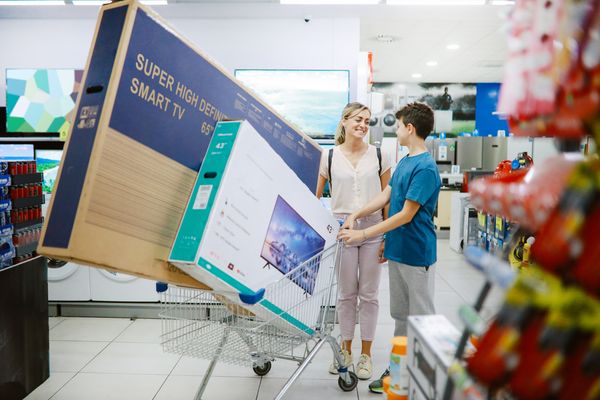Best Buy (BBY 0.15%) launched its technical support subscription service a month ago, and it's already paying dividends for the electronics superstore chain. Even though such services only represent a small proportion of its total revenues, because they have the potential to encourage consumers to make additional purchases, the ripple effect of the program might be felt across sales, profits, and margins.
Pop-up tech support
Total Tech Support is the Geek Squad program on steroids. For $200 a year, Best Buy provides you with unlimited access to tech support for all of your electronics and gadgets, regardless of whether you purchased them at Best Buy.

Image source: Best Buy.
Although subscribers may run into some pitfalls, especially considering that the hefty fee doesn't cover many of the services you might need when setting up your connected home -- mounting, installation, and wiring cost extra, although subscribers do get a discount -- people like the idea.
Data from YouGov BrandIndex suggests Total Tech Support powered by Geek Squad is giving Best Buy a much-needed boost in brand perception. YouGov surveys ask consumers to rank their impression of a brand on a scale ranging from 100, which is "very positive," to -100, which is "very negative." Between May 21 (the day before Total Tech launched) and June 11, Best Buy's consumer satisfaction score surged over 23%, hitting a better than two-year high of 47.
The latest survey also revealed that consumers were now much more likely to shop at the electronics retailer, with 49% of adults saying they were interested in making a purchase from Best Buy compared to 37% of adults who had considered it prior to the service's launch.
Making service a priority
Services like Geek Squad directly provided only a small percentage of Best Buy's $9.1 billion in total first-quarter revenues -- about 5%, or $432 million -- yet they are a key offering because the electronics giant is relying on service to differentiate itself from the competition, particularly e-tailers like Amazon.com (AMZN +1.85%), which last year began offering its own in-home tech support service.
As Best Buy CEO Hubert Joly emphasized in last year's annual report, one of Best Buy's three growth pillars is "to meet the significant technical support needs of customers across their homes, without regard to where they may have purchased their technology products. We also plan to offer more complete solutions to our customers that meet their underlying needs."
While word of Amazon's entrance into the tech support business initially took a bite out of Best Buy's stock price, the shares have long since recovered, and the retailer even went on to partner with Amazon on initiatives such as the forthcoming Fire TV. Best Buy will be the exclusive retailer for the device: Even if you search for the TV on Amazon, you'll be redirected to the Best Buy website, which should make selling a service contract for it much easier for Best Buy than for Amazon.
Tech support subscriptions will remain a hard sell, considering the limited number of times we're actually likely to need a Geek Squad pro to make a house call. And though 24/7 online support is a benefit, at $200 a year, it's going to have a limited appeal.
Still, by indicating to consumers it is paying attention to their needs as the connected home becomes more of a reality, Best Buy is beginning to see a payoff. The real question will be if it can turn its higher brand perception into higher sales.





